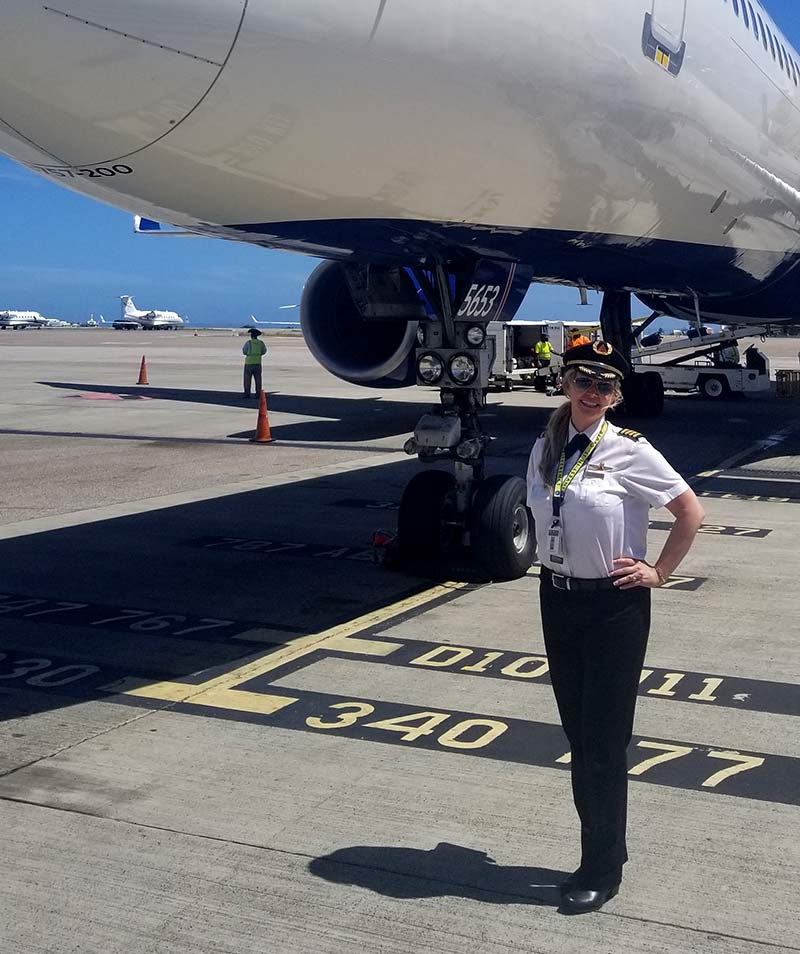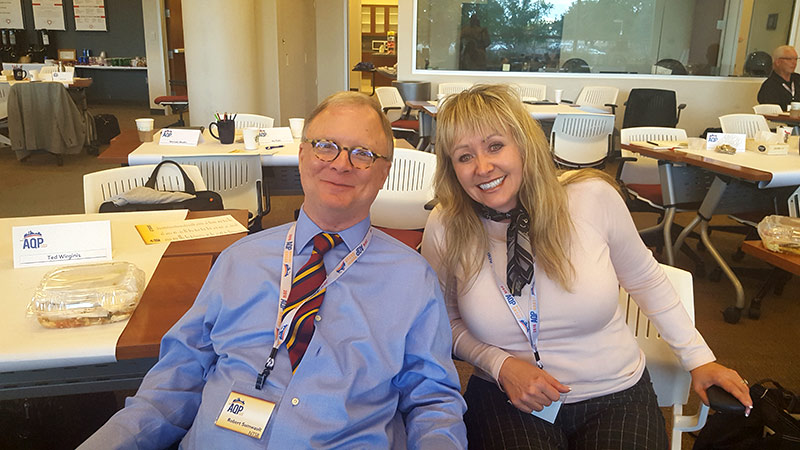Five Questions For ALPA’s Safety Management Systems Director
Powered by Pilots
By Christopher Freeze, Senior Aviation Technical Writer

Capt. Helena Cunningham (Delta) is the director of the Association’s Air Safety Organization Safety Management Systems Group.
Editor’s note: This column showcases the efforts of a cross section of ALPA pilots who volunteer their time and talents to advocate for the union’s priorities and the cadre of knowledgeable and passionate staff specialists who support them.
The primary tasks of ALPA’s Air Safety Organization (ASO) Safety Management Systems Group are to identify and address the unique issues pertaining to SMS such as safety risk management, safety assurance, safety promotion, safety policy, and the collection of reliable safety data.
Air Line Pilot sat down with Capt. Helena Cunningham (Delta), ALPA’s SMS director, to learn more about the pilot who serves as the Association’s lead subject-matter expert on these programs and their role in improving aviation safety worldwide.
Air Line Pilot:
1. How did you get into aviation/flying?
Capt. Helena Cunningham: I fell in love with flying when I was seven years old. I remember taking a flight at that age and was amazed at the experience. Buckled into a seat in a high-performance jet, the sounds, speed, altitude—it was all so exciting. I told my mom on the spot that I wanted to fly airplanes when I grew up. “Sure,” she said as she was taking care of my motion-sick little brother. Some experiences just stay with you for a lifetime, and this flight was one of those. By the time we were at cruise, it was nighttime. A flight attendant asked if I wanted to see the flight deck, and I jumped at the opportunity. Once there, I looked out the front windows and saw lights below, stars above, and the backlit instrument panel. This was truly my “aha” moment, and from that day forward my pilot dreams never wavered. Thankfully, the Army National Guard provided a path to making my flying dreams come true, and the aviation industry, even though tumultuous at times, has been everything I hoped it would be and more.
2. How did you first become involved with ALPA work?
Cunningham: I became involved with ALPA while flying to the training center for my job at my very first major airline, Northwest Airlines. I had the good fortune of sitting next to Capt. Dennis Landry (Delta, Ret.), a dedicated and longtime ALPA safety volunteer. It came up in conversation that I had a master’s degree in safety/human factors, and he just lit up. He mentioned that ALPA didn’t have any human factors expertise within its Central Air Safety Committee, so upon landing I was recruited by another ALPA safety legend, Capt. Lindsay Fenwick (Northwest, Ret.). This was in the late 1990s, and everyone equated human factors with crew resource management so there wasn’t a lot of opportunity in this field yet.
Just 18 months into my airline career, my best friend died in a tragic corporate jet accident, and I channeled the grief from that loss into more safety volunteering, eventually working on the ASO’s Human Factors Committee and subsequently met my next mentor, Capt. Robert Sumwalt (US Airways, Ret). He had conducted significant research into human factors, and I could see that his work really made a difference. I remained in human factors for several years, as a subcommittee chair at my airline, a Critical Incident Response Program coordinator, and the ASO’s Human Factors Group director for six years.
Nearly four years ago, I accepted the position of director of the SMS Group, which has been a tremendous experience. SMS has evolved significantly at our airlines in recent years so it’s been incredibly rewarding to watch this important program grow in use and understanding. Much like my previous work in human factors, SMS has no real estate of its own but is truly embedded in everything we do.
3. What are your roles and responsibilities as ALPA’s SMS director?
Cunningham: “Schedule with Safety” is ALPA’s motto, and SMS is how we ensure safety throughout the industry. I regularly speak with safety leaders at various ALPA pilot groups to discuss SMS and how to become more engaged based on my own experiences as the Central Air Safety Committee chair for my Master Executive Committee (MEC). Safety risk assessments, data use, pilot protections, and data analysis relating to safety programs tend to be concerns frequently discussed. I provide educational pieces at various meetings I attend, and they’ve been very well received. Since there’s a significant regulatory component for SMS, I also write comments to FAA advisory circulars and provide technical expertise for new SMS applications.
Last year, I was elected the International Federation of Air Line Pilots’ Associations’ Safety Management Working Group chair. This position and that of ALPA’s SMS director are mutually beneficial as I’m able to leverage similar work. For example, IFALPA just published a “Positive Safety Culture” paper that I can share with ALPA for maximum visibility and aid to our members. This gives us a more cohesive voice in the industry.

Cunningham and then NTSB board member Capt. Robert Sumwalt (US Airways, Ret.), one of Cunningham’s mentors, attend an Advanced Qualification Program conference.
4. How do ALPA national and staff help you achieve your goals?
Cunningham: Having spent more than 20 years in the ASO structure, I’ve certainly benefited from the expertise and support from countless ALPA Engineering & Air Safety Department engineers, Legal Department attorneys, IT Department experts, and various other dedicated and experienced staff members. These ALPA professionals are available to assist any of our pilots at a moment’s notice, and I couldn’t be more grateful for their support.
During the early stages of the pandemic, IT staff provided significant support for virtual platforms when most of us had never seen a Zoom meeting before. Engineering & Air Safety staff researched and provided input regarding new concerns we had previously never considered, including the use of electrostatic spraying and sanitizing chemicals on oxygen masks and flight deck instruments and so much more. Any changes to the operation of an aircraft require safety risk management or safety risk assessments, leading to increased workload in SMS and quality assurance at every airline and the FAA. During the onset of the pandemic, this work was incredibly challenging as day to day there were temporary regulatory changes to respond to. ALPA’s professional staff kept us on track, informed, and engaged with each other and industry experts.
5. What advice would you give to new pilots who want to get involved with ALPA?
Cunningham: Depending on your area of interest in ALPA work, the answer may vary. If safety-related work is your passion, reach out to your MEC’s Central Air Safety Committee, and for other areas of interest reach out to your elected representatives at your base. Most importantly, determine what you’re passionate about and check your MEC webpage to see the various departments and committees available.
There’s so much interesting work being done on behalf of our pilots at any given time, and there are few things as rewarding as volunteering and assisting fellow pilots. Word of mouth goes a long way, so if you know someone doing ALPA work, have them introduce you to the appropriate committee. We have a lot of talent in our pilot ranks, and ALPA can give you an opportunity to utilize that expertise in a volunteer position. I strongly encourage anyone interested to reach out and raise your hand.

